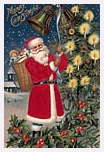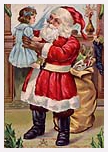 THE 1944 FRUSTRATED CHRISTMAS
THE 1944 FRUSTRATED CHRISTMAS
By: Wally Hoffman
The dense fog which covered all of England and Europe, grounding all the Fighters and Bombers. This meant no critical air support was available to lend support of these men. The men on the lines in the Bulge were in total turmoil. It was not only from not being able to make any kind of a stand; but because of a lack of logistic support, and having to endure the freezing cold. We read in the "Stars and Stripes" and heard over AFN (Armed Forces Network) the desperate need of air support to give them some breathing room. The ground troops were not only pinned down, and freezing, they had no knowledge of what was happening because of the lack of observations and communications. We sat on our fannies at our field in Polebrook warm and dry, and had been planning a gala Christmas Party for the local children including a full turkey dinner. The local English children had never seen oranges, bananas or candy since 1939, since the war started. We had been hoarding all of our fruit and candy plus scrounging for gifts. We had been assured we could bring these guests to the combat mess for Christmas. All the time, there was this black cloud hanging over all of us, concerning the privations of our compatriots who were living a freezing hell in Belgium. Wasn't there anything we could do to help them? Finally on December 19th, the weather in England cleared and the airfields were open for flying. Europe however was still covered by that same huge cloud when you couldn't even see across the street All of us had that very deep personal feeling of wanting to somehow reach out and help the desperate plight of those men on the line in Belgium. Although we had welcomed the enforced stand down from flying combat, everyone was willing to stick their neck out, and take any kind of chance to help, if we could only see the target and the ground when we returned It was a welcome relief to be awakened by that ever-present flashlight and advised we were flying that day. For once there wasn't the usual grumbling; instead an attitude of "lets go, maybe we can be of a little help for those guys". At the usual breakfast, I was immediately hit with the thick smell of frying eggs and bacon, which clung to the air. I was not ready to eat, but could easily envision those poor guys in Belgium would love such a breakfast. Even those eggs staring up at them! Outside it was like the "Black Hole of Calcutta" as we proceeded to the briefing room. You could feel in the room not the usual fear, but the determination to get going. As the curtain was drawn on the huge map we followed the red yarn from Polebrook to Kall, Germany. This was a crossroads barely across the Belgium border in Germany. The mission was to interdict and prevent the normal transport of the German supplies so critical to them for the success and support of their troops in the "Battle of the Bulge". We were advised if you can't identify your target doesn't drop, as the front is so fluid we might be dropping on our own troops. The Weatherman was very pessimistic advising it was still 100% cloud cover over the target, however there was a chance of broken clouds over the target. Coming home a 50% chance, all of Northern England would sock in with a total fog cover. I don't think anyone in the room batted an eye, soon someone said, "Lets go".  As we turned for home we were advised the 50% chance of fog had now become 100% fog cover; and except for a few fields in the south end all of England there was no place to land We scattered and each group ran for England with everyone taking their own course to the open fields where we could land. We finally landed at Bath in Southwest England after breaking out of the cloud cover at about 150 feet. The weather was bad enough even the seagulls were walking. The planes from our group were scattered over six fields, as everyone landed at any field which was still open. We had accomplished nothing, and the poor guys on the lines in the Bulge were continuing to take a beating. Everything was again fogged in for five days. The sun came out on the 24th of December in England and Europe. General Eisenhower ordered maximum effort that every plane possible was to fly that day. Those of us landing at Bath were briefed and the orders were to form composite groups of the planes from the various Bomb Groups into one unit. The bombers, from where ever they were located, were assigned to various targets. No one needed a second invitation and we were soon on our way. This time the weatherman told us there appeared only a 10% chance the weather would remain clear by the end of the day. We took off from where ever we were and assembled into composite groups our target was Kaiserslautern (our bomb group went to four different targets that day.). We never reached the IP of our assigned target, as there was nothing but solid clouds below us. The target was changed to any target of opportunity, so we ended up dropping our bombs on a crossroads. As we crossed the channel there was nothing ahead of us but a solid cloud cover where England should be. We were vectored to an emergency base that had gas piped down the side of each runway, which was ignited to burn off the fog. The landing was a little touchy, because this was a small field and the flames gave the plane additional lift. Stepping hard on the brakes, we finally stopped as we rolled off the end of the runway. This was before we had reversible props and jets. There was hardly room to park the plane. It seemed everyone had also landed there.
That huge Christmas party and Christmas Dinner we had planned for the local children at Polebrook in the main hangar just never happened as we sat on the ground at an emergency field on the "Wash". The ground crews at the base tried their best, but it didn't work out too well. All of our hoarded supplies and gifts were still where we had left them when we finally flew back to our base at Polebrook We had spent a frustrated week flying here and there trying to help the fellows in the Bulge and ended up accomplishing nothing. We had only achieved a lot of frayed nerves with white knuckles and a lot of tight "pucker strings". More disappointing was the many small sad children who had looked forward to a "Yank" Christmas". Soon after Christmas the weather cleared, and all of us in the Air Force managed to give the Germans a taste of "He**" from the heavens. On New Years Day the main hangar, where the major repairs were made all the planes were moved out and decorated in true Christmas fashion. When the children arrived we were given the names of three children and placed the name tags on our hoarded packages as we put them under a large Christmas tree. Santa Claus arrived (by Jeep) and began calling out the names on the packages under the tree. Santa gave each of them a bag containing candy, candy bars, oranges, apples, and bananas. This was followed by concert of Christmas carols, which was suddenly a huge community sing along, as this became our Christmas. We then proceeded to the combat mess with our charges for that delayed Christmas Dinner. There was the usual turkey, stuffing, mashed potatoes, sweet potatoes, cranberries, and pumpkin pie. As the day ended what a wonderful feeling of contentment we all had. When we took our charges full of turkey to the busses to take them home I can still see that permanent smile on their little faces as they clutched their toys and waved good bye.
We may not have been able to help the fellows on the line in the bulge,
but we sure helped some children through a dreary wartime Christmas. It
made up for not being home for Christmas.
|
CONTINUE WITH CHRISTMAS,1944
RETURN TO NEWS RETURN TO THE 20TH.FG RETURN TO THE 1ST.FG
(Wally Hoffman, © 1998. All rights reserved. Reprinted with his kind permission. )
Unless otherwise noted, all content © copyright The Art of Syd Edwards 1998-1999-2000. All rights reserved and reproduction is prohibited.

 December of 1944, was one of the bleak times of the World War II
conflict in Europe. Under the cover of dense fog and freezing cold
which covered all of Europe, the Germans had broken the American lines
in the vicinity of Bastogne. This has become known as the "Battle of
the Bulge". During this time I was a member of a B-17 bomber crew
stationed at Polebrook in northeast England not too far from
Peterborough.
December of 1944, was one of the bleak times of the World War II
conflict in Europe. Under the cover of dense fog and freezing cold
which covered all of Europe, the Germans had broken the American lines
in the vicinity of Bastogne. This has become known as the "Battle of
the Bulge". During this time I was a member of a B-17 bomber crew
stationed at Polebrook in northeast England not too far from
Peterborough.
 We went through debriefing with a cup of Irish Coffee which was more
Irish than coffee This was not Polebrook, but a small British Emergency
Field. The British personnel were totally over run with people, and
soon ran out of food in the mess. All transportation was tied up as
nothing was moving because of the fog. It would take 24 hours to get
additional supplies. The British have always been able to make do. We
were all fed, but we ended up eating fishballs and beets, but there was
plenty of the "British Irish Coffee"
We went through debriefing with a cup of Irish Coffee which was more
Irish than coffee This was not Polebrook, but a small British Emergency
Field. The British personnel were totally over run with people, and
soon ran out of food in the mess. All transportation was tied up as
nothing was moving because of the fog. It would take 24 hours to get
additional supplies. The British have always been able to make do. We
were all fed, but we ended up eating fishballs and beets, but there was
plenty of the "British Irish Coffee"